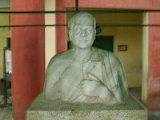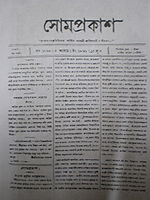
Dwarkanath Vidyabhusan
Encyclopedia
Dwarkanath Vidyabhusan (1820 - 22 August 1886) was an India
n scholar, editor and publisher of the trend-setting weekly Bengali
newspaper Somprakash.
, Nyayratna taught in the traditional centres of Sanskrit
-based education called tol-chatuspatis and also taught some boys in his spare time at his home. Amongst his renowned students were Ishwar Chandra Gupta
and Ramtanu Lahiri
.
, Kolkata in 1832, and studied there up to 1845, winning many prizes and earning fame as a scholar. He won the title of Vidyabhusan in his last examination. He had a short stint as a teacher in Fort William College
and then joined Sanskrit College as a librarian. He later rose to the position of a professor and also assisted Ishwar Chandra Vidyasagar
, when he was principal of the college.
A strong supporter of the women's education, Dwarkanath Vidyabhusan joined other liberals to support Bethune School (established by John Elliot Drinkwater Bethune
) for twenty years.
In 1856, his father established a printing press. It must be mentioned that it was an age when publishers concentrated on an incongruous double bill of religion and erotica but tastes had started changing. In 1857, forty-six Indian-owned printing presses put out 322 books for sale. Although religion still held sway, erotica had started ebbing out. However, his father fell ill and died shortly after establishing the printing press. Vidyabhusan inherited the press and published in Bengali two volumes on the history of Greece and history of Rome, he had written. That was possibly the first time that fat volumes of history written in easy flowing Bengali language was published and it immediately established Vidybhusan as a writer.
 Iswar Chandra Vidyasagar proposed the publication of a weekly newspaper Somprakash partly with the objective of providing employment for a deaf scholar. The newspaper hit the stands in 1858 but the deaf scholar never joined it. The entire responsibility of editing and publishing the newspaper vested in Vidyabhusan. At that time, Bengali newspapers such as Sambad Prabhakar and Sambad Bhaskar were 'defiling the moral environment in Bengal'. With its dignified tastes, lucid language and fearless criticism, Somprakash occupied the top position in the field of Bengali newspapers.
Iswar Chandra Vidyasagar proposed the publication of a weekly newspaper Somprakash partly with the objective of providing employment for a deaf scholar. The newspaper hit the stands in 1858 but the deaf scholar never joined it. The entire responsibility of editing and publishing the newspaper vested in Vidyabhusan. At that time, Bengali newspapers such as Sambad Prabhakar and Sambad Bhaskar were 'defiling the moral environment in Bengal'. With its dignified tastes, lucid language and fearless criticism, Somprakash occupied the top position in the field of Bengali newspapers.
Initially, Somprakash was published from a lane in Champatala in Kolkata. When the railway was extended to Canning in 1862, he shifted the printing press to his native village Chingripota (renamed as Subhasgram), now in South 24 Parganas.
It strongly criticised the powerful indigo planters and landlords. In his evidence before the Indigo Enquiry Committee, Rev. James Long emphatically stated, "These periodicals play a significant role as the mouthpiece of the Indian public." In 1878, when the viceroy, Lord Lytton
, introduced the Vernacular Press Act, specially targeting the Bengali press, Vidyabhusan closed down Somprakash, rather than sign an undertaking about it, agreeing to follow the dictates of the authorities.Sir Richard Temple
, lieutenant governor, called him to his house and requested him not to close down the newspaper. Later, when the Act was withdrawn, he resumed publication of Somprakash, but it never regained its past form and glory.
for sometime and was shocked by the wretched state of affairs of religion and morals. He died at Satna
where he had gone to recoup his health.
Sivanath Sastri
was his sister's son.
Text books: Nitisar, Pathamrita, Chhatrabodh, Bhusansar Byakaran.
Poetry: Prakrito Prem, Prokrito Sukh, Biseswar Bilap.
India
India , officially the Republic of India , is a country in South Asia. It is the seventh-largest country by geographical area, the second-most populous country with over 1.2 billion people, and the most populous democracy in the world...
n scholar, editor and publisher of the trend-setting weekly Bengali
Bengali language
Bengali or Bangla is an eastern Indo-Aryan language. It is native to the region of eastern South Asia known as Bengal, which comprises present day Bangladesh, the Indian state of West Bengal, and parts of the Indian states of Tripura and Assam. It is written with the Bengali script...
newspaper Somprakash.
Father
His father, Harachandra Bhattacharya (better known as Nyayratna) was a scholar. He had studied under Kashinath Tarkalankar, who had a popular traditional centre of education at Hatibagan in north KolkataKolkata
Kolkata , formerly known as Calcutta, is the capital of the Indian state of West Bengal. Located on the east bank of the Hooghly River, it was the commercial capital of East India...
, Nyayratna taught in the traditional centres of Sanskrit
Sanskrit
Sanskrit , is a historical Indo-Aryan language and the primary liturgical language of Hinduism, Jainism and Buddhism.Buddhism: besides Pali, see Buddhist Hybrid Sanskrit Today, it is listed as one of the 22 scheduled languages of India and is an official language of the state of Uttarakhand...
-based education called tol-chatuspatis and also taught some boys in his spare time at his home. Amongst his renowned students were Ishwar Chandra Gupta
Ishwar Chandra Gupta
Ishwar Chandra Gupta was an Indian Bengali poet and writer. Gupta was born in the village Kanchanpalli or Kanchrapara, 24 Parganas district .- Early life :...
and Ramtanu Lahiri
Ramtanu Lahiri
Ramtanu Lahiri was a Young Bengal leader, a renowned teacher and a social reformer. Peary Chand Mitra wrote about him, “There are few persons in whom the milk of kindness flows so abundantly...
.
Early life
After initial education in the traditional centre of village education, the pathsala, Dwarkanath joined Sanskrit CollegeSanskrit College
Sanskrit College is a specialized state-government administered liberal arts college offering an undergraduate degree in Sanskrit language, Pali language, linguistics, and ancient Indian and world history. It is one of the affiliated colleges of the University of Calcutta. Founded on 1 January...
, Kolkata in 1832, and studied there up to 1845, winning many prizes and earning fame as a scholar. He won the title of Vidyabhusan in his last examination. He had a short stint as a teacher in Fort William College
Fort William College
Fort William College was an academy and learning centre of Oriental studies established by Lord Wellesley, then Governor-General of British India. It was founded on July 10, 1800 within the Fort William complex in Calcutta...
and then joined Sanskrit College as a librarian. He later rose to the position of a professor and also assisted Ishwar Chandra Vidyasagar
Ishwar Chandra Vidyasagar
Ishwar Chandra Vidyasagar CIE , born Ishwar Chandra Bandopadhyaya , was an Indian Bengali polymath and a key figure of the Bengal Renaissance....
, when he was principal of the college.
A strong supporter of the women's education, Dwarkanath Vidyabhusan joined other liberals to support Bethune School (established by John Elliot Drinkwater Bethune
John Elliot Drinkwater Bethune
John Elliot Drinkwater Bethune , previously John Elliot Drinkwater, a barrister and law member of the Governor-General's Council, was an Anglo-Indian lawyer and a pioneer in promoting women's education in 19th-century India....
) for twenty years.
In 1856, his father established a printing press. It must be mentioned that it was an age when publishers concentrated on an incongruous double bill of religion and erotica but tastes had started changing. In 1857, forty-six Indian-owned printing presses put out 322 books for sale. Although religion still held sway, erotica had started ebbing out. However, his father fell ill and died shortly after establishing the printing press. Vidyabhusan inherited the press and published in Bengali two volumes on the history of Greece and history of Rome, he had written. That was possibly the first time that fat volumes of history written in easy flowing Bengali language was published and it immediately established Vidybhusan as a writer.
Somprakash

Initially, Somprakash was published from a lane in Champatala in Kolkata. When the railway was extended to Canning in 1862, he shifted the printing press to his native village Chingripota (renamed as Subhasgram), now in South 24 Parganas.
It strongly criticised the powerful indigo planters and landlords. In his evidence before the Indigo Enquiry Committee, Rev. James Long emphatically stated, "These periodicals play a significant role as the mouthpiece of the Indian public." In 1878, when the viceroy, Lord Lytton
Edward Bulwer-Lytton, 1st Baron Lytton
Edward George Earle Lytton Bulwer-Lytton, 1st Baron Lytton PC , was an English politician, poet, playwright, and novelist. He was immensely popular with the reading public and wrote a stream of bestselling dime-novels which earned him a considerable fortune...
, introduced the Vernacular Press Act, specially targeting the Bengali press, Vidyabhusan closed down Somprakash, rather than sign an undertaking about it, agreeing to follow the dictates of the authorities.Sir Richard Temple
Sir Richard Temple, 1st Baronet
Sir Richard Temple, 1st Baronet, FRS, GCSI, CIE, PC was an administrator in British India and a British politician.-Career:...
, lieutenant governor, called him to his house and requested him not to close down the newspaper. Later, when the Act was withdrawn, he resumed publication of Somprakash, but it never regained its past form and glory.
Later life
He established an English school in his native place called Harinavi DVAS High School(Harinavi Dwarkanath Vidyabhusan Anglo Sanskrit High School) and bore the expenses of running the same. A man of high moral standards he stood by the down trodden in society. With advancing age, his health started faltering. He published a monthly magazine Kalpadrum for sometime. Once he went and stayed in VaranasiVaranasi
-Etymology:The name Varanasi has its origin possibly from the names of the two rivers Varuna and Assi, for the old city lies in the north shores of the Ganga bounded by its two tributaries, the Varuna and the Asi, with the Ganges being to its south...
for sometime and was shocked by the wretched state of affairs of religion and morals. He died at Satna
Satna
Satna is a city in central India and a municipal corporation in Satna district in the Indian state of Madhya Pradesh. It is the administrative headquarters of Satna District. Satna is a border city of the state and is touched by the borders of the state of UttarPradesh.-History:Satna got its name...
where he had gone to recoup his health.
Sivanath Sastri
Sivanath Sastri
Sivanath Sastri was a scholar, religious reformer, educator, writer and historian...
was his sister's son.
Works
History: History of Greece, History of Rome (both in Bengali).Text books: Nitisar, Pathamrita, Chhatrabodh, Bhusansar Byakaran.
Poetry: Prakrito Prem, Prokrito Sukh, Biseswar Bilap.

